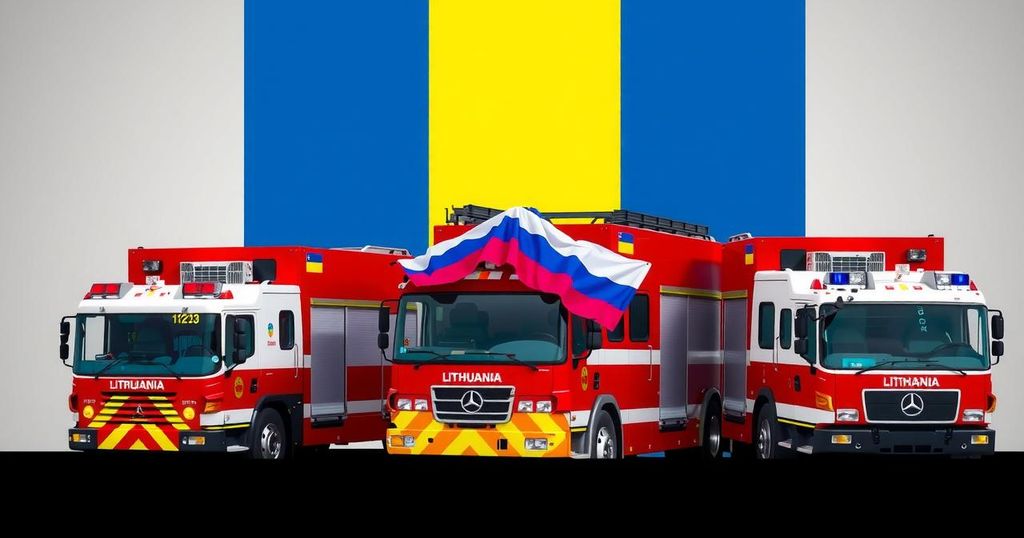Lithuania’s Donation of Zimbabwean Fire Engines to Ukraine Provokes Outcry
Lithuania has drawn widespread condemnation for its decision to donate 17 fire engines, originally acquired by Zimbabwe, to Ukraine following their confiscation during transit. Analysts characterize this move as unlawful and discriminatory, raising concerns over the implications of Western sanctions for Zimbabwe. Calls for the return of the fire engines emphasize the critical need for emergency services in Zimbabwe, illustrating the far-reaching consequences of geopolitical disputes.
Lithuania’s recent decision to redirect 17 fire engines, initially purchased by Zimbabwe from Belarus, to Ukraine has provoked significant outrage among political analysts. The fire engines, which were en route to Harare, were confiscated by Lithuanian authorities, prompting protest from the Zimbabwean government, which insists on their return. Advocate Obert Gutu, a prominent political analyst, described the Lithuanian action as “shameful, scandalous, and unlawful,” emphasizing that Zimbabwe legitimately acquired these vehicles and labeling their confiscation as a violation of international law. Gutu stated, “Lithuania has no legal right… to confiscate and donate the fire engines to Ukraine or any other country without Zimbabwe’s consent.” He further expressed concerns that Zimbabwe should not be embroiled in geopolitical conflicts between Lithuania and Belarus, hinting at possible racial biases influencing Lithuania’s decisions, noting, “If Zimbabwe were a European country, I doubt such a decision would have been made.” Similarly, Mr. Tongai Dana criticized the ramifications of Western sanctions that have led to the engines’ seizure, underlining the necessity of fire engines for emergency services, which are vital for national disaster response. Dana asserted, “The confiscation of these fire engines is a stark example of how Western sanctions negatively impact ordinary people.” He advocated for the removal of sanctions on Zimbabwe, contending that its citizens equally deserve safety and protection as those in Ukraine. Mr. Shadreck Mashayamombe characterized Lithuania’s actions as “callous,” underscoring the life-saving role of fire engines and arguing that their seizure illustrates how sanctions harm countries indiscriminately. He stated, “Our rights are being violated. This issue needs to be resolved diplomatically, not by redirecting Zimbabwe’s property to another country.” Despite ongoing diplomatic efforts, the Zimbabwean government continues to demand the return of the fire engines, highlighting the urgency of resolving this controversy and restoring the intended purpose of this crucial equipment.
The situation surrounding Lithuania’s donation of the fire engines to Ukraine is rooted in a contentious geopolitical landscape involving Zimbabwe, Lithuania, and Belarus. Originally purchased by Zimbabwe, the fire engines were impounded by Lithuanian authorities during their transit. This act has raised serious concerns about the legality of such confiscation under international law, sparking criticism from Zimbabwean officials and analysts. The involvement of Western sanctions in this context adds a layer of complexity, impacting how nations interact on the global stage and affecting emergency preparedness in Zimbabwe. The episodes illustrate broader tensions and raise questions about fairness and discrimination in international relations.
In conclusion, Lithuania’s decision to redirect fire engines owned by Zimbabwe to Ukraine raises significant legal and ethical questions. Analysts have condemned this move as unlawful and indicative of a broader issue concerning the impact of sanctions on vulnerable nations. Zimbabwean authorities continue to call for the return of the equipment, asserting their rightful ownership and the critical need for such resources to ensure public safety. As diplomatic discussions develop, the matter sheds light on the complications arising from geopolitical conflicts and the need for equitable treatment of all nations under international law.
Original Source: bulawayo24.com




Post Comment